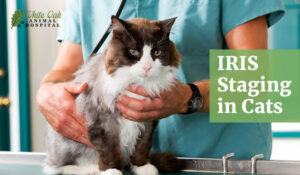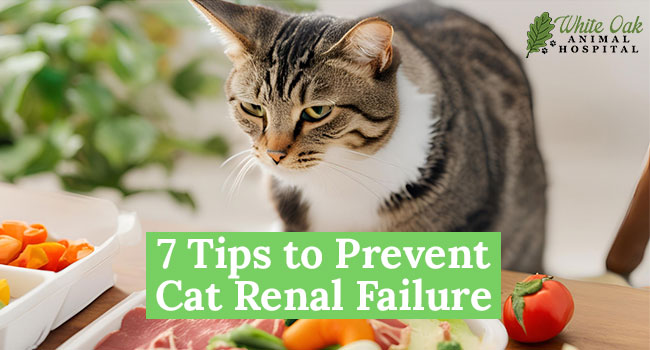
Cat renal failure constitutes an inability of the kidneys to remove waste effectively from the blood in a cat. This inflammation can be brought about over a long period, referred to as chronic, or it can occur suddenly due to factors such as toxins or severe dehydration, referred to as acute. Cat renal failure poses risks that may significantly affect the animal’s overall health.
Thus, when it comes to the facets involved in managing and decreasing the risk of cat renal failure, prevention is vital. It is crucial to learn the reasons behind it and take measures to prevent cats from developing this condition. It is worth mentioning that strict adherence to preventive measures can prolong your cat’s life span and improve its quality. The cat renal failure eBook written by Dr. Damron will enlighten you on methods that can be adopted to help keep your cat in the best form.
What is Cat Renal Failure?
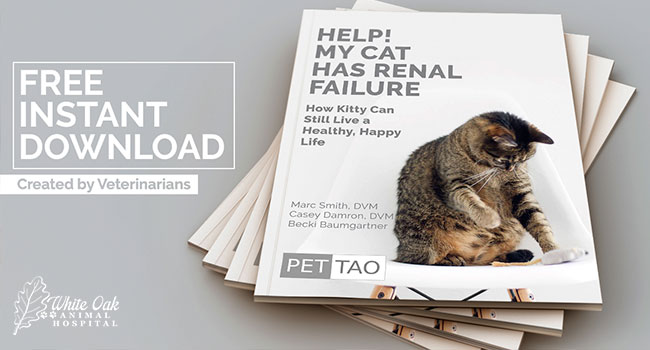
Cat renal failure, or kidney failure, occurs when a cat’s kidneys can no longer effectively filter waste products from the blood. This condition leads to the accumulation of toxins in the body, which can cause severe health issues.
There are two types of cat renal failure: chronic and acute. Chronic renal failure develops gradually over time and is often seen in older cats. It is a progressive condition that cannot be reversed but can be managed to improve the cat’s quality of life. Acute renal failure, on the other hand, happens suddenly and can be caused by factors such as toxins, infections, or severe dehydration. Unlike chronic renal failure, acute renal failure can often be treated successfully if addressed promptly.
Understanding the differences between these types of cat renal failure is crucial for effective prevention and treatment. Proper care and early intervention can help manage conditions and support your cat’s health.
Causes of Cat Renal Failure
Chronic and acute cat renal failure are quite prevalent amongst cats and pinned to some of the following causes. Chronic renal failure is a disease often characterized by slow development over a long period because of aging or heredity or long-term illnesses such as hypertension and diabetes. These conditions tend to impair kidney function gradually and result in cat renal failure.
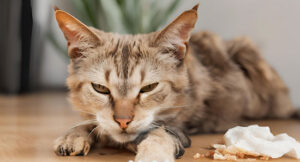 Acute renal failure is a form of kidney disease that is abrupt in onset and may be due to factors such as toxicity ingestion, severe dehydration, or infections. There are potentially lethal poisons like plants like lilies, antifreeze, and even something as simple as ibuprofen. Other causes include urinary obstructions, trauma, or acute tubular necrosis, which in turn causes acute cat renal failure.
Acute renal failure is a form of kidney disease that is abrupt in onset and may be due to factors such as toxicity ingestion, severe dehydration, or infections. There are potentially lethal poisons like plants like lilies, antifreeze, and even something as simple as ibuprofen. Other causes include urinary obstructions, trauma, or acute tubular necrosis, which in turn causes acute cat renal failure.
The factors that could be considered to increase the risk of cat renal failure development include the cat’s age, breed, and other diseases that may exist in the cat. To explain the difference between the two types of cat renal failure, chronic cat renal failure is more prevalent in cats of a certain age. In contrast, any cat may catch acute cat renal failure due to exposure to toxins or health problems.
Understanding these causes and risk factors will enable one to prevent cat renal failure and ensure one’s cat is always in good health.
7 Tips to Prevent Cat Renal Failure
Ensure Proper Hydration
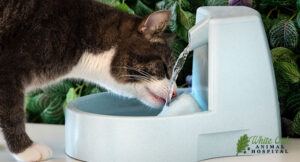 Proper hydration is essential in preventing cat renal failure. Cats often do not drink enough water, which puts pressure on their kidneys. To maintain adequate water consumption, provide them with clean water daily and, if possible, get a pet water fountain; most cats prefer flowing water. Including wet food also has benefits, mainly because it can help cats consume more fluids. Water helps the kidneys filter waste effectively; therefore, maintaining your cat’s hydration will help prevent renal failure. It is also important to note that cats should be offered fresh water frequently. Check with your vet if there are changes in your cat’s water intake.
Proper hydration is essential in preventing cat renal failure. Cats often do not drink enough water, which puts pressure on their kidneys. To maintain adequate water consumption, provide them with clean water daily and, if possible, get a pet water fountain; most cats prefer flowing water. Including wet food also has benefits, mainly because it can help cats consume more fluids. Water helps the kidneys filter waste effectively; therefore, maintaining your cat’s hydration will help prevent renal failure. It is also important to note that cats should be offered fresh water frequently. Check with your vet if there are changes in your cat’s water intake.
Early Treatment of Health Issues
 Prompt treatment of health issues is vital in preventing cat renal failure. Infections and diseases can strain the kidneys, leading to renal issues if left untreated. Regular monitoring for early signs of health problems allows for timely intervention, improving outcomes and preventing complications. If you notice any changes in your cat’s behavior or health, such as increased thirst, appetite, or lethargy, consult your veterinarian promptly. Early detection and treatment can help maintain your cat’s overall health and reduce the risk of cat renal failure.
Prompt treatment of health issues is vital in preventing cat renal failure. Infections and diseases can strain the kidneys, leading to renal issues if left untreated. Regular monitoring for early signs of health problems allows for timely intervention, improving outcomes and preventing complications. If you notice any changes in your cat’s behavior or health, such as increased thirst, appetite, or lethargy, consult your veterinarian promptly. Early detection and treatment can help maintain your cat’s overall health and reduce the risk of cat renal failure.
Provide a Balanced Diet
 One way to help prevent cat renal failure is by offering your cat a high-quality Blood-building diet based on principles of Eastern Food Therapy. Anyone with kidney issues must consume the right foods to feed the kidneys and the whole body. You could also provide your cat with canned or dry commercial foods with high-quality protein while limiting phosphorus and sodium content that can negatively affect the kidneys.
One way to help prevent cat renal failure is by offering your cat a high-quality Blood-building diet based on principles of Eastern Food Therapy. Anyone with kidney issues must consume the right foods to feed the kidneys and the whole body. You could also provide your cat with canned or dry commercial foods with high-quality protein while limiting phosphorus and sodium content that can negatively affect the kidneys.
We recommend feeding your cat wet food to ensure they have adequate water intake. It is always essential to consult your vet about diet and provide foods that may be suitable for your cat. There are also special diets for kidney diseases that can help prevent renal problems in cats. A proper feeding regimen for cats is essential to help keep the kidneys healthy and avoid cat renal failure.
Avoid Toxic Substances
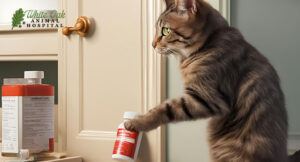 It is essential to steer clear of toxic substances to prevent cat renal failure. Some common toxins harmful to cats include certain plants like lilies, antifreeze, medications such as ibuprofen, and household chemicals. These substances can severely damage the kidneys if ingested and may lead to renal failure.
It is essential to steer clear of toxic substances to prevent cat renal failure. Some common toxins harmful to cats include certain plants like lilies, antifreeze, medications such as ibuprofen, and household chemicals. These substances can severely damage the kidneys if ingested and may lead to renal failure.
Pet owners should take precautionary measures by keeping toxic items out of reach and carefully monitoring your cat’s environment. Seek veterinary care immediately if you suspect your cat has been exposed to toxins. Avoiding harmful substances can safeguard your cat’s health and reduce the risk of cat renal failure.
Regular Veterinary Checkups
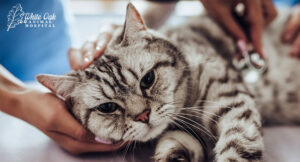 To prevent cat renal failure, regular checkups with your veterinarian are necessary. This way, your cat will receive a routine examination, and you will have peace of mind that there are no underlying kidney conditions or other ailments that can develop in your cat. Your veterinarian can perform blood tests and urinalysis to assess the kidneys and track any changes that could signal feline kidney disease—this way, cat renal failure can be prevented, or at least its progression could be slowed.
To prevent cat renal failure, regular checkups with your veterinarian are necessary. This way, your cat will receive a routine examination, and you will have peace of mind that there are no underlying kidney conditions or other ailments that can develop in your cat. Your veterinarian can perform blood tests and urinalysis to assess the kidneys and track any changes that could signal feline kidney disease—this way, cat renal failure can be prevented, or at least its progression could be slowed.
Plan a yearly or biannual checkup for your cat, depending on age and health conditions. With regular cat exams, you can rest assured that you are doing the best for your feline friend and will prevent cat renal failure from developing.
Monitor Blood Pressure
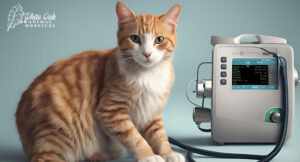 Keeping an eye on your cat’s blood pressure is also crucial in preventing cat renal failure. Hypertension, or high blood pressure, can strain the kidneys, leading to renal issues. Regular monitoring allows for early detection of hypertension, enabling timely intervention to manage and control blood pressure. Your veterinarian can perform blood pressure checks during routine exams and prescribe medication to regulate blood pressure levels if necessary. By monitoring blood pressure and addressing hypertension promptly, you can help.
Keeping an eye on your cat’s blood pressure is also crucial in preventing cat renal failure. Hypertension, or high blood pressure, can strain the kidneys, leading to renal issues. Regular monitoring allows for early detection of hypertension, enabling timely intervention to manage and control blood pressure. Your veterinarian can perform blood pressure checks during routine exams and prescribe medication to regulate blood pressure levels if necessary. By monitoring blood pressure and addressing hypertension promptly, you can help.
Maintain a Healthy Weight
Ensuring your cat maintains a healthy weight prevents cat renal failure. Obesity puts extra strain on the kidneys, increasing the risk of renal issues. To manage your cat’s weight effectively, provide a balanced diet with appropriate portions and avoid overfeeding. Encourage regular exercise and play to promote calorie burning and muscle tone. Monitor your cat’s weight regularly and consult your veterinarian for personalized weight management advice. Maintaining a healthy weight can help protect your cat’s kidneys and reduce the likelihood of cat renal failure.
 Preventing cat renal failure requires proactive measures and attentive care from pet owners. Regular veterinary checkups, proper hydration, a balanced diet, and avoiding toxic substances are essential in maintaining kidney health and preventing renal failure in cats. If you ever have concerns about your cat’s health, don’t hesitate to seek professional advice from your veterinarian.
Preventing cat renal failure requires proactive measures and attentive care from pet owners. Regular veterinary checkups, proper hydration, a balanced diet, and avoiding toxic substances are essential in maintaining kidney health and preventing renal failure in cats. If you ever have concerns about your cat’s health, don’t hesitate to seek professional advice from your veterinarian.
We encourage you to visit White Oak Animal Hospital for comprehensive care tailored to your cat’s needs. With over 28 years of experience, we offer integrative options not available elsewhere, including TCVM Telemedicine consultations. Our team is dedicated to providing the best possible care for your feline companion.
We’re pleased to offer a free eBook co-authored by Dr. Damron called “Help! My Cat Has Renal Failure: How Kitty Can Still Live A Healthy Happy Life”. This ebook provides valuable insights and tips on managing cat renal failure. Gain knowledge about the causes, symptoms, and treatment options available. Understanding your pet’s condition empowers you to make informed decisions for their well-being. Download your free ebook today and embark on the journey to help your cat live a long and healthy life.
Frequently Asked Questions
How can I tell if my cat is dehydrated?
Signs of dehydration in cats include lethargy, dry gums, sunken eyes, and decreased skin elasticity. Encourage your cat to drink more water and consult your veterinarian if you suspect dehydration.
What foods should I avoid feeding my cat?
Avoid feeding your cat toxic or harmful foods, such as onions, garlic, chocolate, caffeine, alcohol, and certain medications like ibuprofen. Additionally, limiting the intake of foods high in phosphorus and sodium can exacerbate renal issues.
Can chronic renal failure be managed at home?
Yes, with proper guidance from your veterinarian, chronic renal failure can be managed at home through dietary changes, medication, and regular monitoring. However, following your vet’s recommendations closely is essential to ensure the best possible care for your cat’s condition.
Related Posts
-
Facts About Cat Kidney Failure
If your pet experiences any symptoms of cat kidney failure, immediately take them to your…
-
Cat Kidney Failure Herbal Remedies
I use herbs to help improve my health and well-being. Do you?Probably so. Then, doesn't…
-
Feline House Soiling and What You Can Do
Behavior problems, house soiling especially, can be one of the most frustrating topics to deal…
-
Easy Cat UTI Prevention
Cat UTI prevention is simple once you understand the root cause. Your veterinarian can help…








